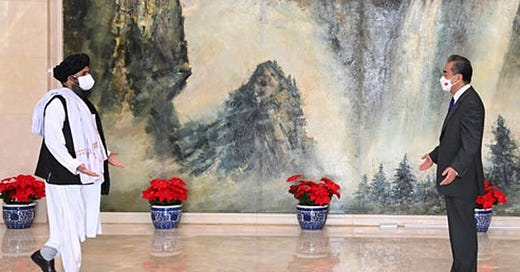Emerging Markets Daily - August 20
China Eyes Afghanistan's Rare Earth Metals, Nigeria Start-Up Boom, Toyota Slashes Production, The Hot ETF That Avoids China, Commodities Sell-Off Accelerates
The Top 5 Stories Shaping Emerging Markets - August 20
Amid Taliban Transition, China Eyes Afghanistan’s Rare Earth Metals
Business Standard (India)
“China appears to be eyeing to clinch lucrative projects to exploit mineral-rich Afghanistan, especially the trillions of dollars worth of rare-earth metals, as it calibrated its policy to recognise the Taliban government.”
“Rare-earth metals in Afghanistan were estimated to be worth anywhere between USD one trillion to USD three trillion in 2020, a CNBC report this week quoted Ahmad Shah Katawazai, a former diplomat at the Afghan Embassy in Washington.”
“Rare-earth metals are a key component for a host of advanced technologies like IPhones and hi-tech missile guidance systems. On Wednesday, China said it will decide on extending diplomatic recognition to the Taliban in Afghanistan after the formation of the government in the country, which it hoped would be ‘open, inclusive and broadly representative…’”
“The rare-earth sector is one in which China has a strong advantage and it is a sector that plays a critical role in the development of strategic emerging industries, it said, adding that China is involved in several projects in Afghanistan.” Business Standard reports.
Electronic Payments Fuels Start-Up Boom in Nigeria
Financial Times
“After years in which Nairobi, the Kenyan capital, led Africa’s tech revolution, momentum has shifted to west Africa and to Lagos, which has attracted more than $1bn in venture capital in the past two years from Silicon Valley, China and elsewhere.”
“In 2020, as the coronavirus pandemic hit tech fundraising, Nigerian companies raised $307m in venture funding, a fifth of Africa’s total, according to Partech, a venture fund, in its annual report on technology in Africa. Nearly 40 per cent went to the fintech sector.”
“The swell in fintech in Nigeria has come even as critics argue the government has taken a heavy-handed, sometimes antagonistic approach to the nascent sector, and as internet connectivity rapidly expands across the continent, in part thanks to high-speed subsea cables backed by the likes of Google and Facebook.”
“The ‘last billion’ — as the population of people least connected to the internet are known — are coming online and many of them live in Nigeria, home to one in seven Africans on the continent. ‘Even if I wasn’t Nigerian, I would probably be here,’ says Tayo Oviosu, founder of Paga, a payments company that was Umunnabuike’s first fintech partner and processed $2.3bn in transactions for 17m users last year. The opportunity of Nigeria . . . is really profound — there are so many things to solve.’”
“The sheer size of Nigeria — 200m people, including roughly 60m adults who lack bank accounts — has driven explosive fintech growth. Despite the economic woes of an economy that for decades has been too reliant on oil, the country makes up nearly a fifth of Africa’s output of roughly $2.6tn.” Neil Munshi reports.
Toyota Slashes Production 40% Amid Chip Shortage
BBC
“Toyota is to slash worldwide vehicle production by 40% in September because of the global microchip shortage. The world's biggest carmaker had planned to make almost 900,000 cars next month, but has now reduced that to 540,000 vehicles.”
“Volkswagen, the world's second-biggest car producer, has warned it may also be forced to cut output further. The Covid pandemic boosted demand for appliances that use chips, such as phones, TVs and games consoles.”
“On Thursday, German firm Volkswagen, which cut output earlier in the year, told Reuters: ‘We currently expect supply of chips in the third quarter to be very volatile and tight. We can't rule out further changes to production.’”
“Toyota's other rivals, including General Motors, Ford, Nissan, Daimler, BMW and Renault, have already scaled back production in the face of the global chip shortage.”
“Until now, Toyota had managed to avoid doing the same, with the exception of extending summer shutdowns by a week in France the Czech Republic and Turkey.” BBC reports.
Investors Flock to Emerging Markets ETF That Avoids China
Bloomberg
“Investors who love emerging markets but are spooked by China’s regulatory crackdown are pouring more money than ever into an ETF seemingly tailor-made for this moment.”
“The $1.2 billion iShares MSCI Emerging Markets ex-China ETF, an exchange-traded fund that tracks stocks in developing countries except China, has attracted $304.8 million of fresh investment in August. That’s put the fund on course for the biggest monthly inflow since its inception four years ago, according to data compiled by Bloomberg.”
“‘China just went through a horrible month in terms of control and intervention that’s affected several industries,’ said Andres Calderon, a money manager at Miami-based RVX Asset Management LLC. ‘So the sales pitch is easy: Buy emerging markets, without the risk from China.’”
“The rush to snap up equities from other emerging markets comes as a MSCI Inc. gauge of Chinese stocks as well as the iShares MSCI China ETF that tracks it sink to their lowest levels in almost 14 months. The index wiped out about a third of its value since February, after the central bank drained short-term cash from the market, extending losses as growth expectations dwindle and the government steps up regulation affecting the education and technology industries.” Maria Elena Vizcaino reports.
Commodities Markets Sell-Off Accelerates
Australian Financial Review
“Commodity markets suffered a violent sell-off as mounting anxiety about slower economic growth sent oil and metal prices tumbling and iron ore plunged on weaker steel demand. The Australian currency fell to a 10-month low.”
“The iron ore price plunged nearly 15 per cent to $US130.2 a tonne and is down 45 per cent from the record high of $US237.57 it reached just three months ago. This continues to weigh on the Australian dollar, which fell 1.2 per cent to US71.5¢ as the risk of the currency falling below US70¢ grew.”
“Strategists had tipped iron ore’s valuation to ease from elevated levels due to China’s environmental steel production curbs, but the intensity of this pullback – which Morgan Stanley economists said was the commodity’s fastest price correction on record – has pundits rattled.”
“‘We did suspect there was quite a bit of speculation built into the iron ore price when it was above $US200, but the sharp speed of this correction has taken a lot by surprise. When these things burst, they move pretty quickly,’ said ANZ senior commodity strategist Daniel Hynes.” Alex Gluyas reports.
What We’re Also Reading…
Samsung Passes Intel to Re-Take #1 Spot in Chip Sales in 2Q
Korea Herald
“Samsung Electronics Co. regained the No.1 spot in chip sales in the second quarter of the year, surpassing its archrival Intel Corp. for the first time in almost three years, on the back of robust sales of memory semiconductors, a report showed Friday.”
”The South Korean tech giant logged $20.29 billion in chip sales in the April-June period, up 19 percent from a quarter earlier, according to the latest McClean Report released by market researcher IC Insights.”
”Samsung, the world's largest memory chipmaker, racked up $19.26 billion in integrated circuit (IC) sales, while $1.03 billion came from optoelectronic, sensor and discrete (OSD) sales. IC Insights said strong demand and rising prices for DRAM and flash memory products helped Samsung to displace Intel Corp. for the first time since the third quarter of 2018 when the memory market was in boom.” Korea Herald reports.Tech Sell-Off Pushes Hong Kong Stocks to Bear Market
Financial Times
“Beijing’s approval of a strict data privacy law has knocked Chinese technology shares traded in Hong Kong, sending the city’s main equities barometer sinking into a bear market after it fell a fifth from its February peak.”
“The Hang Seng index dropped 1.8 per cent on Friday, led by steep falls in internet and ecommerce stocks including Meituan and Alibaba. Friday’s declines came after state news agency Xinhua announced the data law had been passed and would take effect on November 1.”
“The sharp falls in Hong Kong and on mainland Chinese bourses in recent weeks highlight mounting investor concerns that Beijing will step up its regulatory clampdown on sectors ranging from financial technology to education and gaming.” Hudson Lockett reports.





